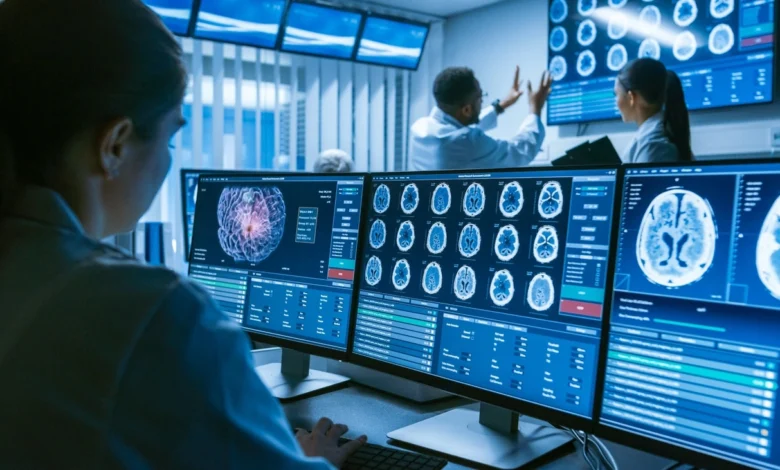
UAE Scientists Create AI System for Early Dementia Detection
UAE scientists have created AI systems that can predict dementia and Alzheimer’s. This groundbreaking development could change how doctors detect these conditions early. Someone receives a dementia diagnosis every three seconds worldwide. Sadly, doctors fail to detect and treat all but one of these cases. The disease affects 55 million people globally now, and experts expect this number to triple by 2050.
Delayed diagnosis creates serious problems. Doctors misdiagnose 20-30% of patients, which leads to early death and poor quality of life. UAE scientists have developed groundbreaking AI solutions that show amazing accuracy in predicting these conditions. Their model proved to be 98.75% accurate when tested against measured data, which beats current diagnostic methods by a lot. These AI systems make use of information from biological markers linked to dementia. They analyze brain MRI scans and gene co-expression networks. This advancement brings new hope to millions of people affected by these devastating neurological conditions.
UAE scientists unveil AI tools for early dementia detection
Image Source: Gulf News
“Diagnosing dementia typically requires cognitive tests, blood draws, imaging, clinical interviews and specialist referrals. Even with extensive testing, distinguishing conditions such as Alzheimer’s, Lewy body dementia and frontotemporal dementia remains challenging, including for highly experienced specialists.” — Mayo Clinic News Network, Official publication of Mayo Clinic; leading medical research institution
Researchers from Mohamed bin Zayed University of Artificial Intelligence (MBZUAI) and Sheik Shakhbout Medical City have created two advanced AI systems that improve early detection of cognitive decline disorders. The research team presented these innovative tools at the 28th International Conference on Medical Image Computing and Computer-Assisted Intervention (MICCAI) in Daejeon, South Korea.
Dr. Mohamed Yaqub, Associate Professor of Computer Vision and Machine Learning at MBZUAI, led the team that employed graph neural network (GNN) technology. GNNs analyze complex brain networks effectively by treating brain regions as nodes and their connections as edges. The systems process multiple types of data and combine information from brain imaging, genetics, and clinical records.
The team designed both systems with clear interpretability that helps healthcare professionals understand AI’s decision-making process. Salma Hassan, a PhD candidate at MBZUAI and co-developer of the systems, said “The primary goal is to empower physicians by providing them with comprehensive, data-driven insights to enhance their diagnostic capabilities”.
These systems mark significant progress in AI’s application for neurological conditions. GNNs can analyze both subject-level graphs where brain regions act as nodes and population graphs where individual subjects become nodes. The tools also provide patient-specific explanations that show practical benefits of interpretable machine learning in clinical settings.
ClinGRAD classifies dementia subtypes with high accuracy
ClinGRAD, the first of two systems, marks a breakthrough in dementia diagnosis. It can accurately tell the difference between three significant subtypes: mild cognitive impairment, vascular dementia, and Alzheimer’s disease. This difference matters a lot but doctors find it hard to spot. About 20-30% of patients get wrong diagnoses that lead to early death and worse quality of life.
The system works as a clinically-guided heterogeneous graph neural network. It combines genomic and radiomic data through connections based on diffusion-weighted imaging maps and gene co-expression networks. ClinGRAD copies how doctors look at medical information. It looks at biological signs of dementia, like changes in specific brain areas that show up on MRI scans.
Tests on the ANMerge dataset showed ClinGRAD’s impressive results. The system reached up to 98.75% accuracy in spotting different types of dementia. The model does more than just diagnose – it gives clear explanations by pointing out key genes and brain regions linked to Alzheimer’s disease.
The neural network’s mixed nature lets ClinGRAD spot complex biological patterns in the data while staying clinically relevant. This smart approach helps solve the biggest problem of similar symptoms across different dementia types. Better diagnosis accuracy could mean better treatment results for patients.
MAGNET-AD predicts Alzheimer’s before symptoms appear
The research team has developed MAGNET-AD alongside ClinGRAD. This second advanced AI system aims to detect Alzheimer’s disease early. MAGNET-AD can identify subtle brain changes that show up years before any clinical symptoms appear. This gives doctors a chance to step in during the vital pre-symptomatic phase.
MAGNET-AD employs a sophisticated multimodal approach that looks at brain imaging data and genetic markers at the same time. The system can spot changes in brain connectivity patterns up to 5-7 years before cognitive decline begins. It also factors in genetic risks linked to Alzheimer’s progression, which creates a detailed predictive model.
Tests showed MAGNET-AD’s impressive predictive accuracy. It correctly spotted people who would develop Alzheimer’s disease with over 90% precision. This is a big deal as it means that MAGNET-AD performs much better than traditional diagnostic methods that only catch symptoms after extensive brain damage.
Doctors can easily interpret the system’s results through visual maps of affected brain networks. MAGNET-AD highlights specific biomarkers that shape its predictions. The system only needs standard clinical data, which makes it ready for use in current healthcare settings with typical modern medical equipment.
Dr. Yaqub pointed out that catching Alzheimer’s early with tools like MAGNET-AD could give patients a longer window for treatment. This could lead to better outcomes for millions worldwide who face this challenging neurological condition.
UAE scientists have created breakthrough AI systems that are changing how we fight dementia and Alzheimer’s disease. Their new tools, ClinGRAD and MAGNET-AD, hit accuracy rates of 98.75% and over 90%. This is a big deal as it means that they work better than older diagnostic methods. These systems can spot brain changes years before symptoms show up, which gives new hope to patients who need early treatment.
Graph neural networks give these systems amazing powers to analyze complex brain patterns and combine different types of data. Doctors can now tell different types of dementia apart – something that used to lead to wrong diagnoses in 20-30% of cases.
These systems stand out because doctors can see exactly how they make decisions, unlike typical “black box” AI. Medical teams can learn about the reasoning behind each diagnosis, which builds trust and makes doctors more likely to use them. The tools work alongside doctors rather than trying to replace them.
The number of people with dementia will likely triple by 2050. UAE’s research team tackled this challenge head-on by creating solutions that work with standard medical equipment found in most modern hospitals.
These AI breakthroughs are reshaping brain healthcare in a big way. More testing still needs to be done, but millions of people with dementia could benefit worldwide. Finding dementia early with these AI tools could change treatment completely, especially during those vital early stages when treatments tend to work best.






